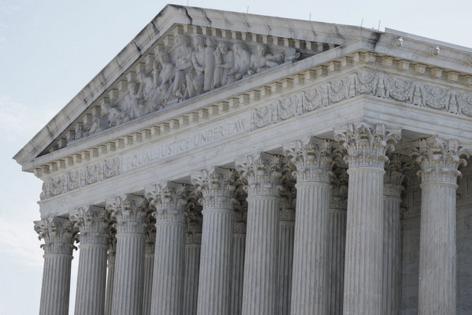Supreme Court to review Trump birthright citizenship order
Published in News & Features
WASHINGTON — The Supreme Court will decide the future of President Donald Trump’s effort to overturn birthright citizenship, agreeing Thursday to hear oral arguments next month.
Rather than rule on the Trump administration’s requests to pause rulings from lower courts in Washington, New Jersey and Maryland that kept the policy unchanged, the justices set oral arguments for May 15 on the issue. The Trump administration asked the justices to intervene last month after several lower courts ruled that his policy likely violated the Constitution.
The justices would likely rule in the case before the end of the court’s term in June.
The case is the most high-profile test of Trump’s effort to overturn birthright citizenship through executive order. After campaigning on a promise to end the guarantee, Trump signed an executive order to do so on his first day in office. The order excludes from birthright citizenship children born to people in the United States without legal status or those on temporary visas.
States and others challenging the executive order have said in court filings that it could strip citizenship from hundreds of thousands of children each year.
A federal judge in Washington barred the order’s enforcement in January. Since then multiple courts have ruled that the order likely violates the Constitution, federal immigration law and federal administrative law.
The U.S. Courts of Appeal for the 1st, 4th and 9th circuits have rejected the Trump administration’s appeals to allow enforcement while the case works its way through the courts, so the Trump administration turned to the justices.
The administration argues that the lower-court judges overstepped their bounds. The government said in court filings that a provision in the 14th Amendment requires people to be “subject to the jurisdiction” of the United States to receive birthright citizenship, and that Trump has the power to exclude the children of noncitizens without the need for Congress to act.
The Justice Department’s Supreme Court applications also criticized lower court judges in general for ruling against the administration with nationwide injunctions, saying it has “reached a fever pitch” since Trump’s inauguration.
The states and groups challenging the order argued that the policy ran up against more than a century of history as well as the text of the Constitution. In a brief led by New Jersey Attorney General Matthew J. Platkin, one group of challengers argued that it would strip hundreds of thousands of American-born children of citizenship and “inflict tremendous and irreparable harms” on the country.
“For over 100 years, this Court, Congress, and the Executive Branch have all agreed that the Constitution guarantees citizenship to children born in this country, including those born to undocumented or non-permanent immigrants,” the challengers wrote.
The cases are Trump et al. v. CASA Inc. et al.; Trump et al. v. Washington, et al.; and Trump et al. v. New Jersey et al.
©2025 CQ-Roll Call, Inc., All Rights Reserved. Visit cqrollcall.com. Distributed by Tribune Content Agency, LLC.







Comments